1. Highland Maize Research
Objectives:
- Evaluate, with a view to commercial release, the semi-elite, elite and super elite hybrid combinations in the form of single, three-way, double, varietal and top crosses
- Conserve and rejuvenate breeding nurseries for late maturity maize germplasm of all sorts, including inbred lines
- Improve, by recurrent selection procedures, the basic breeding stocks, Kitale synthetic II (KSII) and Ecuador 573 (EC573), under various breeding schemes and monitor progress in recurrent selection populations
- Identify, document diseases and other constraints leading to low maize yields
- Investigate other areas of related to maize genetics and breeding research
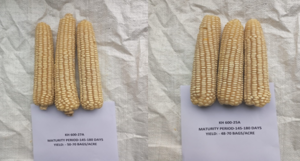
Highland Hybrid maize varieties
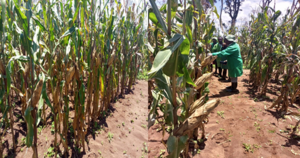
Maize research site in Kitale
2. Other cereals:
- Developing high-yielding, drought-resistant, and disease-resistant varieties of sorghum and finger millet and Researching integrated pest management strategies, weeds and disease control methods.
- Developing high-yielding, drought-resistant, and disease-resistant varieties of sorghum and finger millet and Researching integrated pest management strategies, weeds and disease control methods.
3. Food legume crop development:
- Research on improved varieties of dry beans, soybeans, and groundnuts with higher yields, disease resistance, and better nutritional profiles.
- Enhancing the efficiency of nitrogen fixation in legumes and its impact on soil health.
- Innovating in processing technologies and value addition for legumes.
4. Roots and Tuber Crops Research
- Developing and validating disease-resistant varieties of Cassava and sweet potatoes to improve crop stability and yield and also enhance their nutritional content to address dietary deficiencies.
- Improving storage, processing, and preservation methods to reduce losses and increase shelf life.
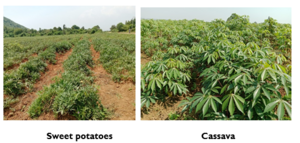
5. Horticulture Crops Research
The Institute also carries out research on horticultural Crops mainly on vegetables, fruits and Aromatic plants to address needs within the respective regions. The objectives are to generate, adapt and promote horticultural crops technologies (varieties, crop production, post-harvest, value addition and production of clean horticultural planting material) for all agro-ecological zones; to strengthen the capacity for implementing horticultural and industrial crops, enhance availability of knowledge, information and technologies on horticultural and industrial crops, and to strengthen research linkages with other relevant stakeholders for enhanced priority horticultural product value chains.
- Maintaining mother block for Mango (45 trees). Varieties are Apple, Vandyke, Tommy Artkin, Ngowe, Kent, Boribo and Sabre (root stalk) – Aiming at i) promoting adoption of improved mango varieties. Ii) source of scions for mango seedling propagation
- Maintained mother block for Guava cultivars (germplasm) – 108 trees – KTL1, KTL3, KTL5 are the preferred cultivars
- On station fruit tree/tree nursery for clean seedlings propagation) To enhance supply of quality planting materials – (Avocado, tree tomato, guava, Rosemary, pomegranate, etc)
- Promotion of macadamia nuts cultivation for enterprise diversification. Mother block for seedling propagation and availability
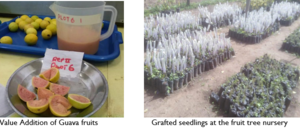
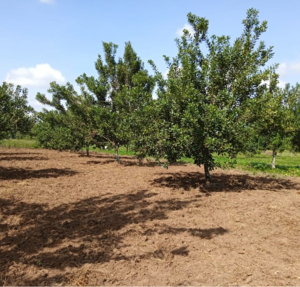
Macadamia Orchard
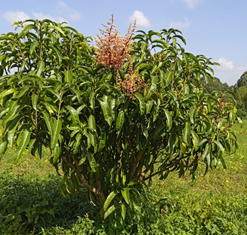
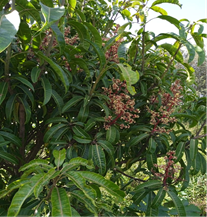
Mango Orchard
6. Oil Palm value chain production and commercialization:
- Production and Multiplication of high-yielding and disease-resistant oil palm varieties.
- Developing and promoting technologies for value addition in oil palm production, including processing and product diversification.
- Assessing the economic impact and market potential of oil palm products.
7. Natural Resource Management
Purpose
To develop and validate appropriate NRM knowledge and technologies to improve the production capacity of the available soil and water resources and catalyse their adoption. The main research themes in NRM include
- Land use planning: – soil characterization, land-use and land cover mapping, GIS, capacity building and soil and plant analysis.
- Irrigation, drainage and management of problematic soils :- irrigation engineering, irrigation systems, irrigation agronomy, drainage, hydrology, water resource management and management of problem soils- acidic, calcitic and sodic soils
- Soil and water management – soil erosion control, design of soil and water conservation structures, soil-water conservation, rain and run-off water harvesting, conservation tillage, agroforestry and landscape integrity.
- Integrated soil fertility management – soil fertility management and plant nutrition research including soil health and organic agriculture.
- Environmental research– climate change adaptation and mitigation strategies, meteorological data collection and synthesis.
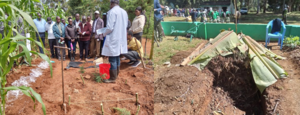
Land Planning- Capacity building on soil sampling and analysis in Uasin Gishu County (Left) and integrated soil fertility management-Composting
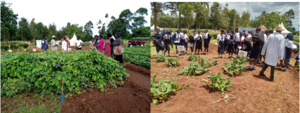
Integrated soil fertility management-use of cover crop (Left) and Soil and water management- Institute water harvesting (Zai pits) in vegetable production
8. Crop Protection Research
Developing and Validating technologies for control of pests and diseases in food, horticulture and pasture crops
- Providing pest advisory services for both internal and external clients
9. Animal production:
The Centre Livestock Research Objective at FCRI Kitale is to:
- Contribute to the realization of food security, poverty reduction and environmental conversation through increased productivity and commercialization. The region mandate covers five Counties (Trans Nzoia, Uasin Gish, West Pokot and Elgeyo Marakwet) with diverse ecology. KALRO FCRI Kitale regional Livestock program, encompasses adaptive research for all livestock enterprises as prioritized by the regional consultative meetings of stakeholders in the agricultural sector.
Activities include:
- Pasture varietal evaluations,
- Agronomy in fodder crops,
- Conservation, socio-economics of livestock and their products,
- Value addition and natural resources management
- Animal health and nutrition diagnostic laboratory services in helminthology, tick borne diseases and aflatoxin.
10. Research Methods and Applied Statistics (RMAS)
- Provide support in Research methods and applied statistic issues; proposal writing, data coding, cleaning and processing, interpretation of data outputs, report writing and scientific publication.
- Provide advisory support in knowledge. Information and technologies in crops and livestock agricultural research
- Participate in data management; development of meta data, storage of research data (hard and soft copies), retrieval and usage of research data, ownership and policy issues in regards to research data
- Participate in data analysis for both survey and experimental research studies; means, frequencies, statistical modeling (regressions), application of both parametric and non-parametric statistics e.t.c
- Participate in review of scientific documents; seminar, conference and journal papers, end of project reports, policy documents
- Participate in mentorship of willing KALRO staff, young professionals and students on attachment on career development and development of Curriculum Vitae
11. Socio-economics and Policy development
- Describe and characterize farming systems, diagnose farmer constraints and prioritize research interventions against the available resources
- Evaluate the Economic and social acceptability and economic viability of developed technologies along agricultural productivity value chain
- Carryout adoption and Impact assessment to measure and evaluate the effects of agricultural innovations on stakeholders along the agricultural product value chain
- Evaluate marketing and policy issues influencing the production of key enterprises within the mandate region
- Evaluate methodologies for disseminating technologies to various beneficiaries along the agricultural productivity value chain
12. Information Communication Technology (ICT):
The ICT section generally provides support towards achievement of strategic objectives in key results areas (KRA) two, four and five of the KALRO strategic plan 2023/24-2027/28. As the main result area, under KRA 4 that involves strengthening of organization capacities and resource management, in addition to ICT technical support, the section actively participates in attainment of requisite strategies as follows:
- Being the Section’s core purpose, under strategic objective 4.7 that aims to strengthen and manage information and communication technology (ICT) infrastructure and services, the section is charged with the following strategies:
- Development updating and implementation of ICT platforms and databases
- Establishment, operationalization, and maintenance of ICT equipment and infrastructure
- Automation of KALRO business processes
Information, Knowledge and Outreach:
- Collect and collate knowledge and information for storage, ease of retrieval and dissemination
- Developing effective methods for transferring research findings and innovations to farmers and stakeholders.
- Strengthen KALRO FCRI’s internal and external communication
- Implementing training programs to build the capacity of farmers, extension workers, and other stakeholders.
- Strengthening partnerships with other research institutions, government agencies, and private sector actors to enhance collaborative efforts.
Agricultural Information Centre (AIC)
Agricultural Information Centre is a project that aims to digitize, package, and disseminate agricultural content using ICT channels to rural areas free of charge. The project is a collaboration between Communications Authorities of Kenya (CA) and Kenya Agricultural and Livestock Research organization (KALRO). The AICs have been constructed in seven KALRO centres including FCRI-Kitale. The project targets three groups: Youth, Women and People with disabilities (PWDs) and seeks to address: Poor bandwidth connectivity; Lack of digital devices & digital illiteracy to access KALRO digitized products and services; and Rural farmers without the means to access Good Agricultural Practice (GAP) content. This is made possible through access to free computing devices linked to massive agricultural database and high-speed internet connectivity.

Agricultural Information Centre at FCRI Kitale
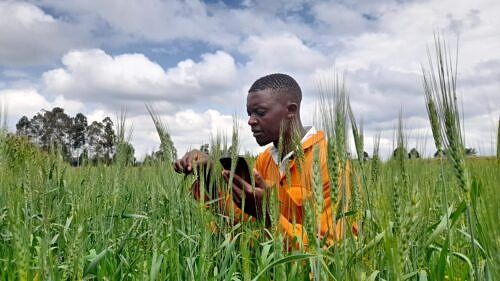


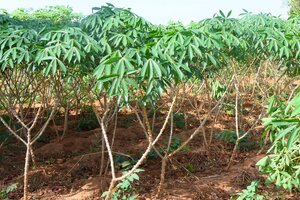 of 2013. The Institute’s main focus is to generate, validate and release technologies on food crops to clients. It focuses on cereals (maize, wheat, sorghum, millet, and rice), grain legumes (dry beans, pigeon peas, green grams, dolichos) and root and tuber crops (potatoes, sweet potatoes, and cassava, yams and arrow roots). In order to contribute to food security, the Institute has seven Centres which conduct research on basic, strategic, applied and adaptive research using the value chain approach from production, market and use.
of 2013. The Institute’s main focus is to generate, validate and release technologies on food crops to clients. It focuses on cereals (maize, wheat, sorghum, millet, and rice), grain legumes (dry beans, pigeon peas, green grams, dolichos) and root and tuber crops (potatoes, sweet potatoes, and cassava, yams and arrow roots). In order to contribute to food security, the Institute has seven Centres which conduct research on basic, strategic, applied and adaptive research using the value chain approach from production, market and use.









